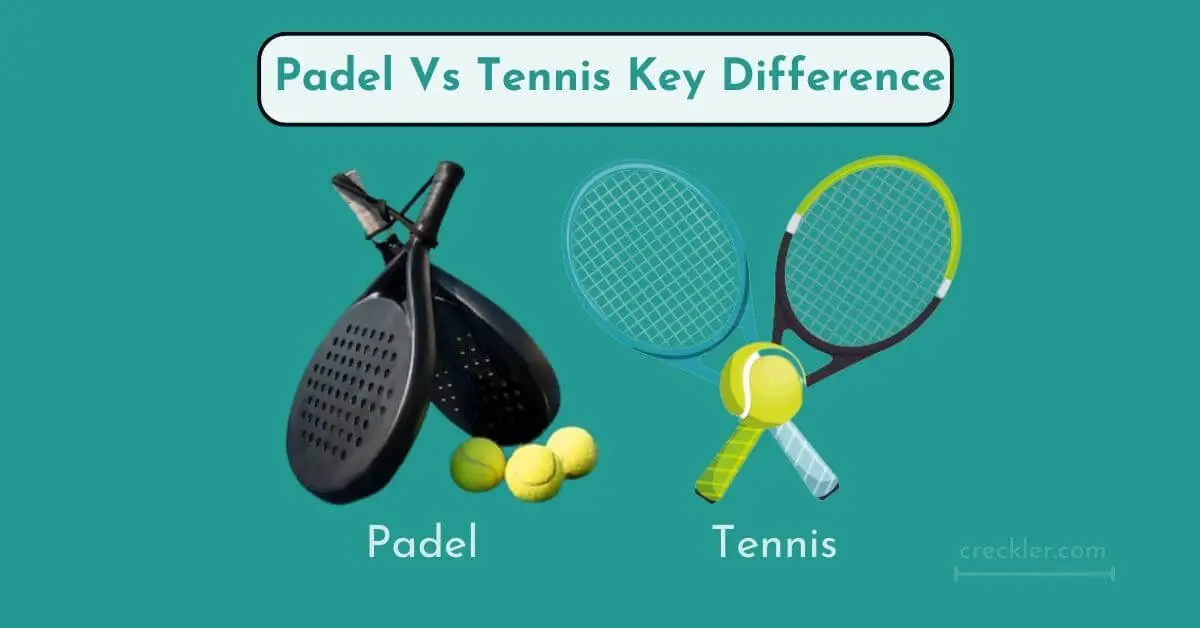Padel Vs Tennis 10 Key Differences You Need To Check In 2024
When it comes to racket sports, Padel Vs Tennis are two popular choices that offer thrilling game-play and opportunities for physical fitness. Although they are similar, they also have unique qualities that make them unique. Find the difference between Tennis Vs Padel.
Tennis Vs Padel Ball Difference
Padel is more forgiving and accessible sport than tennis. It is easy to learn and play, and it is less physically demanding. However, tennis is more traditional sport with a longer history. It is more challenging sport, and it offers higher level of competition.
There are some similarities and differences between a Padel Ball Vs Tennis Ball. Here you can find the key difference between Tennis Ball and Padel Ball.
Padel Vs Tennis Comparison
| Feature | Padel | Tennis |
|---|---|---|
| Racket | Smaller, with a foam core | Larger, made of a variety of materials |
| Ball | Smaller, with a lower air pressure | Larger, with a higher air pressure |
| Court | Smaller, with glass walls | Larger, without walls |
| Service | Underhand only | Underhand or overhand |
| Scoring | Same as tennis | Same as tennis |
| Gameplay | More social, more creative shotmaking | More individual, more challenging |
1. Padel Court Size Vs Tennis Court
Tennis courts are larger, measuring 78 feet in length and 27 feet in width for singles matches. The net splits the court in half, evenly, into two sections.
In contrast, Padel courts are smaller, measuring 66 feet in length and 33 feet in width. Padel courts are enclosed by glass or mesh walls, adding an extra dimension to the game.
2. Tennis Vs Padel Equipment
Padel Vs Tennis differ in terms of equipment. Tennis players use larger rackets and a felt-covered tennis ball that bounces significantly higher.
Padel rackets are solid and perforated to provide better control, while the ball used in Padel is depressurized, resulting in a lower bounce.
3. Scoring System
Both sports follow a similar scoring system, but Padel introduces a unique scoring element called “no advantage.” In Padel, when the score reaches 40-40, also known as deuce, the next point earned gives the advantage to the scoring team.
If the scoring team wins that point, they win the game. The score resets to deuce if they fail to win the point.
| Check: Baseball Vs Softball Key Difference |
4. Playing Technique
Tennis places a greater emphasis on power and aggressive shot-making. The larger court and faster ball require players to cover more ground and generate significant racquet head speed.
Padel, on the other hand, focuses more on ball placement, strategy, and court positioning. The enclosed court and the use of walls allow players to create angles and employ tactical shots.
5. Gameplay Dynamics
Tennis rallies tend to be longer and more physically demanding due to the larger court size and faster pace. Players engage in intense baseline rallies, explosive serves, and quick reflex volleys.
In Padel, rallies are generally shorter, as the enclosed court and walls enable players to use deflections and strategy to outmaneuver opponents.
6. Padel Vs Tennis Serving
Tennis serves are overhead and typically require a player to hit the ball into a specific service box diagonally opposite. In Padel, serves are underhand, similar to a lob or an upward shot.
The serve must be hit into the opponent’s diagonal service box, and the ball must bounce once in the receiver’s box.
7. Court Surface
Tennis is played on various surfaces, including grass, clay, and hard courts, each with its unique characteristics that affect ball speed and bounce.
Padel courts, on the other hand, are typically made of artificial grass or synthetic materials, providing a consistent playing surface.
8. Doubles Dominance
While both Padel Vs Tennis can be played in singles and doubles formats, Padel is predominantly a doubles game.
Padel’s enclosed court and strategic game-play make it ideal for teamwork, communication, and synchronized plays between partners.
9. Accessibility And Popularity
Tennis has a long-standing history, global recognition, and a larger player and fan base. It is more widely accessible, with numerous public and private tennis courts worldwide.
Padel, although rapidly growing, is still less prevalent but gaining popularity internationally. Padel’s smaller court size and the social aspect of doubles play attract players of all skill levels.
10. Professional Scene
Tennis has a well-established professional circuit with prestigious tournaments such as the Grand Slam events and the ATP and WTA Tours. Padel’s professional scene is relatively newer but expanding. The World Padel Tour is gaining international recognition, featuring top-ranked players competing in various tournaments.
Understanding Padel Vs Tennis 10 key differences allows players and enthusiasts to appreciate the unique aspects of both Padel and Tennis. Each sport offers its own set of challenges, strategies, and thrills, catering to diverse preferences and playing styles.
| Check: Sports Event Pyramid |
Padel Racket Vs Tennis Racket
Padel rackets are smaller and more compact, with a rounded shape and heavier weight compared to Tennis rackets. They offer better maneuverability in the enclosed Padel court.
Tennis rackets, on the other hand, have an elongated oval or teardrop-shaped head, providing a larger sweet spot. They are lighter and designed for greater swing speed and maneuverability in the larger Tennis court.
Conclusion
Padel Vs Tennis stand as distinct racket sports with their own rules, court sizes, equipment, and gameplay dynamics. By exploring the in-depth differences between the two, players can make informed choices based on their preferences, skill levels, and the type of experience they seek on the court.

